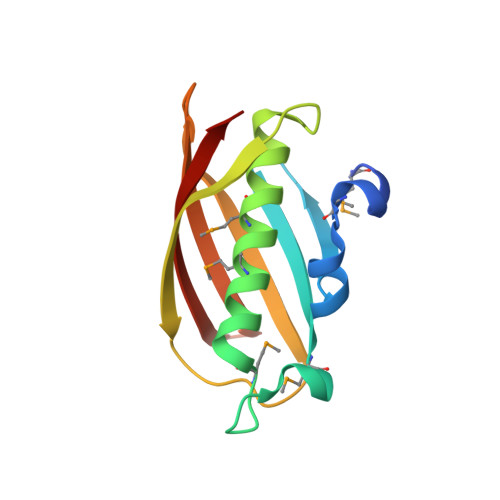Structure and activity of the Pseudomonas aeruginosa hotdog-fold thioesterases PA5202 and PA2801.
Gonzalez, C.F., Tchigvintsev, A., Brown, G., Flick, R., Evdokimova, E., Xu, X., Osipiuk, J., Cuff, M.E., Lynch, S., Joachimiak, A., Savchenko, A., Yakunin, A.F.(2012) Biochem J 444: 445-455
- PubMed: 22439787
- DOI: https://doi.org/10.1042/BJ20112032
- Primary Citation of Related Structures:
1ZKI, 3QY3 - PubMed Abstract:
The hotdog fold is one of the basic protein folds widely present in bacteria, archaea and eukaryotes. Many of these proteins exhibit thioesterase activity against fatty acyl-CoAs and play important roles in lipid metabolism, cellular signalling and degradation of xenobiotics. The genome of the opportunistic pathogen Pseudomonas aeruginosa contains over 20 genes encoding predicted hotdog-fold proteins, none of which have been experimentally characterized. We have found that two P. aeruginosa hotdog proteins display high thioesterase activity against 3-hydroxy-3-methylglutaryl-CoA and glutaryl-CoA (PA5202), and octanoyl-CoA (PA2801). Crystal structures of these proteins were solved (at 1.70 and 1.75 Å for PA5202 and PA2801 respectively) and revealed a hotdog fold with a potential catalytic carboxylate residue located on the long α-helix (Asp(57) in PA5202 and Glu(35) in PA2801). Alanine residue replacement mutagenesis of PA5202 identified four residues (Asn(42), Arg(43), Asp(57) and Thr(76)) that are critical for its activity and are located in the active site. A P. aeruginosa PA5202 deletion strain showed an increased secretion of the antimicrobial pigment pyocyanine and an increased expression of genes involved in pyocyanin biosynthesis, suggesting a functional link between PA5202 activity and pyocyanin production. Thus the P. aeruginosa hotdog thioesterases PA5202 and PA2801 have similar structures, but exhibit different substrate preferences and functions.
Organizational Affiliation:
Department of Chemical Engineering and Applied Chemistry, Banting and Best Department of Medical Research, University of Toronto, Toronto, Ontario M5G 1L6, Canada.
















